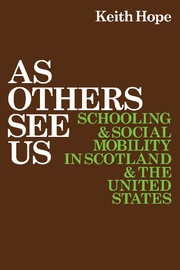Book contents
- Frontmatter
- Contents
- Acknowledgments
- Introduction
- 1 Scotland: A meritelective system?
- 2 Comparison of Scotland with England and Wales
- 3 Comparison of Scotland with the United States
- 4 IQ + effort = merit
- 5 The institutions of managed meritelection
- 6 Was selection carried out fairly?
- 7 Meanings of key terms
- 8 Does deprivation affect life chances?
- 9 Market situation
- 10 Intelligence and occupational mobility
- 11 Intelligence and vertical mobility
- 12 Scottish society
- 13 Understanding other people's norms
- 14 Merit or desert?
- Notes
- References
- Index
8 - Does deprivation affect life chances?
Published online by Cambridge University Press: 05 February 2012
- Frontmatter
- Contents
- Acknowledgments
- Introduction
- 1 Scotland: A meritelective system?
- 2 Comparison of Scotland with England and Wales
- 3 Comparison of Scotland with the United States
- 4 IQ + effort = merit
- 5 The institutions of managed meritelection
- 6 Was selection carried out fairly?
- 7 Meanings of key terms
- 8 Does deprivation affect life chances?
- 9 Market situation
- 10 Intelligence and occupational mobility
- 11 Intelligence and vertical mobility
- 12 Scottish society
- 13 Understanding other people's norms
- 14 Merit or desert?
- Notes
- References
- Index
Summary
In embarking on an empirical analysis of the effects of deprivation, we must distinguish the question we are asking from other questions with which it might easily be confused. Our analysis is asking how far deprivation in childhood affects later position in the stratification order, and it asks that question of men and not of women. It is therefore concerned with the long-term effects of deprivation, but not with its intergenerational transmission, in the sense of asking whether children who grow up in deprived families tend to become the parents of deprived families. It is quite possible to suppose that deprivation sets limits to a man's educational and occupational success without inferring that he passes the deprivation on, in some sense, to his children. And it is possible to suppose that an adult who was deprived in childhood re-creates some of the conditions of his early life in playing his role as a parent, even though his deprivations did not hinder his occupational career. Indeed, it is arguable that the mother, rather than the father, may be the key figure in the transmission of deprivation within the family, and that when girls of low intelligence marry they may have a particular difficulty in creating the kind of home environment that enables children to aspire beyond material and cultural poverty to a more satisfactory level of living.
Level of analysis
What we are looking for, then, is not the intergenerational transmission of deprivation, but possible effects of childhood deprivation, physical as well as social, on market position.
- Type
- Chapter
- Information
- As Others See UsSchooling and Social Mobility in Scotland and the United States, pp. 137 - 164Publisher: Cambridge University PressPrint publication year: 1985



